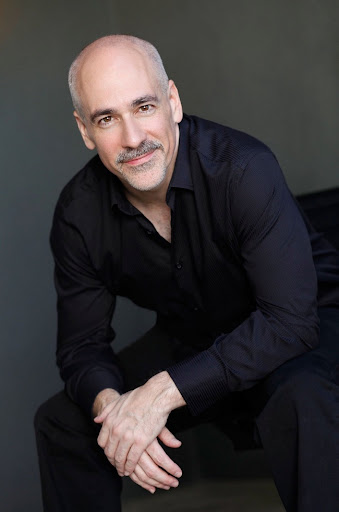by Mike Telin

On Tuesday, April 18 at 7:30 pm, Daniel Reith will lead The Cleveland Orchestra in Boyer’s multimedia work that honors the immigrant experience by combining music, narration, and historic images. Directed by Donald Carrier, Ellis Island: The Dream of America features seven actors who portray the journeys of immigrants from seven countries on their way to America, beginning in the early parts of the past century. The concert is a prelude to the inaugural Mandel Opera & Humanities Festival: The American Dream. Click here for free tickets (required). Following Tuesday’s performance, the work will be performed on the Orchestra’s educational concerts.
“Cleveland will be the 115th orchestra, and those concerts will mark the work’s 262nd through 265th performances,” Boyer said during a Zoom conversation from his studio in north Los Angeles.
“During the 22/23 season Ellis Island has 22 performances by ten orchestras, and it’s a really good problem to have — but I do have to keep spreadsheets to keep up with it. I’m delighted of course. It’s exciting and we’ve been talking about this with Cleveland for a long time, so it’s wonderful that it’s coming to fruition.”
Boyer conceived the idea in 1999, when he was 29 years old, but it wasn’t until 2001that he was able to enlist the Bushnell Center for the Performing Arts in Hartford, Connecticut to commission it.
What sparked the idea? “I was in a period of writing pieces about Greek Mythology, and I was thinking about American Mythology and the things that define us and our history.
A big part of our history and the way that we think of ourselves as a nation is so tied up with this idea of immigration, and being a nation of immigrants. And I started to think about that topic.”
Although he can’t recall the exact moment, at one point he remembered learning about the Emma Lazarus poem “The New Colossus” in school. “So many of us as kids learn the final lines of the poem, ‘Give me your tired, your poor, Your huddled masses yearning to breathe free, …’”
While researching Boyer discovered the Ellis Island Oral History Project and Peter Coan’s book, Ellis Island Interviews. “I thought this was a great idea for a piece and the more I thought about it I realized that it needed to be a piece for actors and orchestra.” He was surprised to discover that while some composers had set texts from the Oral History Project, none had used those texts to create a work of this magnitude.
Boyer said that the stories in the piece cover a thirty year period from 1910 to 1940 and reflect the stories that were captured in the Oral History Project. The seven that he selected are representative of a much larger number of immigrants, and the issues the stories address remain relevant today.
“Of course, since I wrote the piece things have changed so dramatically in ways that I utterly couldn’t have foreseen. I had received the commission and was writing the piece when September 11, 2001 occurred. And I remember thinking very clearly that we’re all so devastated and shocked, and reevaluating everything. So I had a discussion with people at the Bushnell Center and the Hartford Symphony Orchestra about whether or not I should change it to reflect what had occurred. I realized that it ought not to change. I should stay with my original idea because it was still something that needed to be celebrated. So I’m glad that I decided not to add some sort of dark epilogue or something like that.”
Boyer said it’s extraordinary that our nation has become so difficult and divisive. But despite the political divisions, the piece has endured. “I haven’t changed a thing — it’s exactly as it was in 2002. And for the most part, people from across the political spectrum have found something very resonant about the piece. I’ve heard people say that ‘you’re trying to make some sort of political statement.’ This was never a political piece. This was always a historical piece. And it is a history that is true. Every word that is said is something that came from an interview, with a real person telling a real story that was their life.”
Ellis Island: The Dream of America had the good fortune to be featured on PBS Great Performances. And while it included a cast of stars, Boyer said the beauty of the piece is that you don’t need world-renowned actors to perform the piece. “It’s been done with community theater, college theater, and professional theater groups. And one of the nice things about it is that it’s been a great vehicle for collaboration between orchestras and theater companies.”
Is Boyer directly related to Ellis Island? “I am,” he said, adding that it was something he learned while composing the piece. “My last name is Boyer, which is more French-Canadian, but my mother’s maiden name is Pannone, and I knew that my great grandfather Francesco Pannone had come from Italy when he was a young man. And Providence [RI], which is where I grew up, is the home to a lot of Italian immigrants.”
Boyer said that while he was composing the piece, the Ellis Island immigration records came online. So he searched for Francesco Pannone and found a number of people with that name. “I asked my grandfather Edward Pannone about the circumstances, and he said that Francesco came with his sister Micalena Pannone. So I searched for that and found that they had come through Ellis Island from Naples in early May of 1912. I didn’t need to know any of this to write the piece, but somehow it made it even more personally resonant to know that one of the 12 million stories is of my great-grandfather who found his way to Providence.”
Click here for more information about the piece.
Published on ClevelandClassical.com April 14, 2023.
Click here for a printable copy of this article



